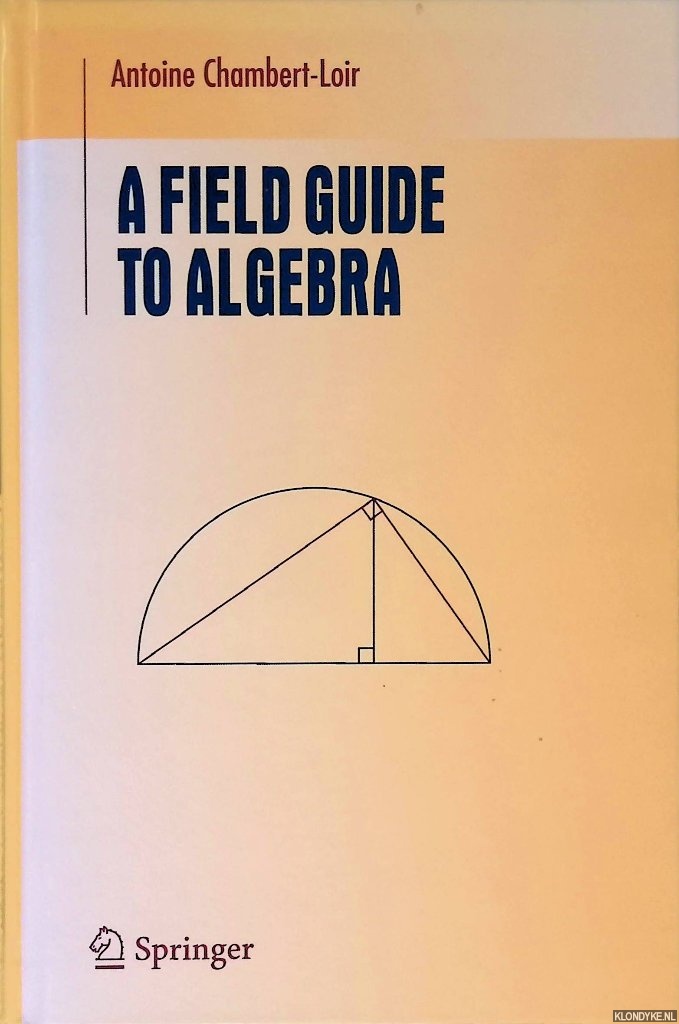
Onze boeken
A Field Guide to Algebra
Door Antoine Chambert-Loir
Categorie | Algemeen wetenschap |
|---|---|
Boeknummer | #341970-ZA22 |
Titel | A Field Guide to Algebra |
Auteur | Chambert-Loir, Antoine |
Boektype | Gebonden hardcover |
Uitgeverij | New York : Springer-Verlag |
Jaar van uitgave | 2005 |
ISBN10 | 0387214283 |
ISBN13 | 9780387214283 |
Taal | Engels |
Beschrijving | Original boards, illustrated with numerous equations and diagrams, 8vo. Undergraduate Texts in Mathematics |
Samenvatting | Focuses on the structure of fields and is intended for a second course in abstract algebra. This book provides proofs of the transcendence of pi and e. It explores equations, both polynomial and differential, and the algebraic structure of their solutions. This unique textbook focuses on the structure of fields and is intended for a second course in abstract algebra. Besides providing proofs of the transcendance of pi and e, the book includes material on differential Galois groups and a proof of Hilbert's irreducibility theorem. The reader will hear about equations, both polynomial and differential, and about the algebraic structure of their solutions. In explaining these concepts, the author also provides comments on their historical development and leads the reader along many interestin... (Lees verder)g paths. In addition, there are theorems from analysis: as stated before, the transcendence of the numbers pi and e, the fact that the complex numbers form an algebraically closed field, and also Puiseux's theorem that shows how one can parametrize the roots of polynomial equations, the coefficients of which are allowed to vary. There are exercises at the end of each chapter, varying in degree from easy to difficult. To make the book more lively, the author has incorporated pictures from the history of mathematics, including scans of mathematical stamps and pictures of mathematicians. Antoine Chambert-Loir taught this book when he was Professor at École polytechnique, Palaiseau, France. He is now Professor at Université de Rennes 1. This is a small book on algebra where the stress is laid on the structure of ? elds, hence its title. Youwillhearaboutequations,bothpolynomialanddi? erential,andabout the algebraic structure of their solutions. For example, it has been known for centuries how to explicitely solve polynomial equations of degree 2 (Baby- nians, many centuries ago), 3 (Scipione del Ferro, Tartaglia, Cardan, around th 1500a. d.), and even 4 (Cardan, Ferrari,xvi century), using only algebraic operations and radicals (nth roots). However, the case of degree 5 remained unsolved until Abel showed in 1826 that a general equation of degree 5 cannot be solved that way. Soon after that, Galois de? ned the group of a polynomial equation as the group of permutations of its roots (say, complex roots) that preserve all algebraicidentitieswithrationalcoe? cientssatis? edbytheseroots. Examples of such identities are given by the elementary symmetric polynomials, for it is well known that the coe? cients of a polynomial are (up to sign) elementary symmetric polynomials in the roots. In general, all relations are obtained by combining these, but sometimes there are new ones and the group of the equation is smaller than the whole permutation group. Galois understood how this symmetry group can be used to characterize the solvability of the equation. He de? ned the notion of solvable group and showed that if the group of the equation is solvable, then one can express its roots with radicals, and conversely. |
Pagina's | 195 |
Conditie | Goed — Name in pen on title page. |
Prijs | € 25,00 |

Onze gebruikte boeken verkeren in goede tweedehands staat, tenzij hierboven anders beschreven. Kleine onvolkomenheden zijn niet altijd vermeld.










